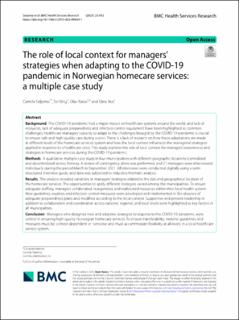| dc.contributor.author | Seljemo, Camilla | |
| dc.contributor.author | Wiig, Siri | |
| dc.contributor.author | Røise, Olav | |
| dc.contributor.author | Ree, Eline | |
| dc.date.accessioned | 2023-06-12T08:44:56Z | |
| dc.date.available | 2023-06-12T08:44:56Z | |
| dc.date.created | 2023-05-30T08:52:17Z | |
| dc.date.issued | 2023 | |
| dc.identifier.issn | 1472-6963 | |
| dc.identifier.uri | https://hdl.handle.net/11250/3070899 | |
| dc.description.abstract | Background
The COVID-19 pandemic had a major impact on healthcare systems around the world, and lack of resources, lack of adequate preparedness and infection control equipment have been highlighted as common challenges. Healthcare managers’ capacity to adapt to the challenges brought by the COVID-19 pandemic is crucial to ensure safe and high-quality care during a crisis. There is a lack of research on how these adaptations are made at different levels of the homecare services system and how the local context influences the managerial strategies applied in response to a healthcare crisis. This study explores the role of local context for managers’ experiences and strategies in homecare services during the COVID-19 pandemic.
Methods
A qualitative multiple case study in four municipalities with different geographic locations (centralized and decentralized) across Norway. A review of contingency plans was performed, and 21 managers were interviewed individually during the period March to September 2021. All interviews were conducted digitally using a semi-structured interview guide, and data was subjected to inductive thematic analysis.
Results
The analysis revealed variations in managers’ strategies related to the size and geographical location of the homecare services. The opportunities to apply different strategies varied among the municipalities. To ensure adequate staffing, managers collaborated, reorganized, and reallocated resources within their local health system. New guidelines, routines and infection control measures were developed and implemented in the absence of adequate preparedness plans and modified according to the local context. Supportive and present leadership in addition to collaboration and coordination across national, regional, and local levels were highlighted as key factors in all municipalities.
Conclusion
Managers who designed new and adaptive strategies to respond to the COVID-19 pandemic were central in ensuring high-quality Norwegian homecare services. To ensure transferability, national guidelines and measures must be context-dependent or -sensitive and must accommodate flexibility at all levels in a local healthcare service system. | en_US |
| dc.language.iso | eng | en_US |
| dc.publisher | BioMed Central | en_US |
| dc.rights | Navngivelse 4.0 Internasjonal | * |
| dc.rights.uri | http://creativecommons.org/licenses/by/4.0/deed.no | * |
| dc.title | The role of local context for managers’ strategies when adapting to the COVID-19 pandemic in Norwegian homecare services: a multiple case study | en_US |
| dc.type | Peer reviewed | en_US |
| dc.type | Journal article | en_US |
| dc.description.version | publishedVersion | en_US |
| dc.rights.holder | © The Author(s) 2023 | en_US |
| dc.source.volume | 23 | en_US |
| dc.source.journal | BMC Health Services Research | en_US |
| dc.source.issue | 1 | en_US |
| dc.identifier.doi | 10.1186/s12913-023-09444-1 | |
| dc.identifier.cristin | 2150022 | |
| dc.relation.project | SHARE - Centre for Resilience in Healthcare: 5091 | en_US |
| dc.source.articlenumber | 492 | en_US |
| cristin.ispublished | true | |
| cristin.fulltext | original | |
| cristin.qualitycode | 2 | |

